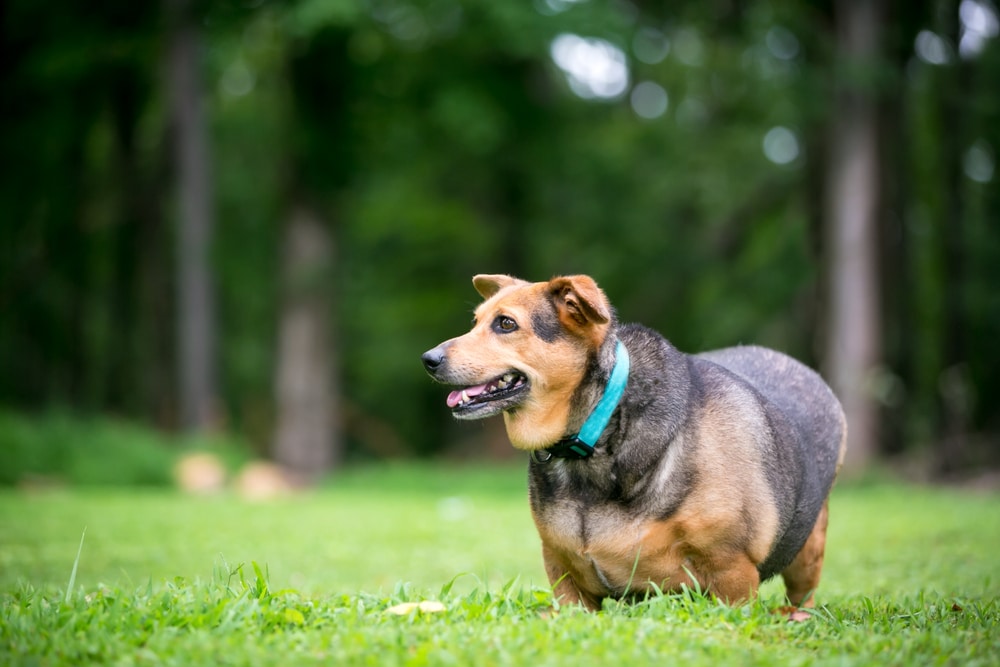Being overweight can lead to health complications in humans, but what about dogs? It is easy to overlook the significance of a healthy weight for our canine friends, but neglecting the importance of a healthy weight for our canine companions can lead to severe health problems. What happens if a dog is overweight? Can obesity cause major problems or even shorten a dog’s lifespan?
Excess fat on a dog affects its bones and internal organs by exerting strain on them both, which results in joint harm and breathing problems. Overweight dogs may be more prone to diabetes, heart disease, or even cancer! Ensure your pet remains fit by keeping an eye on its diet and exercise.
Table of Contents
Health Risks For Overweight Dogs

Being overweight can be harmful to dogs, just as it is to people. Dogs that are overweight face several health risks that can affect their quality of life and overall well-being.
Canine Obesity
Canine obesity results when a dog takes in too many calories. A dog is considered overweight when it is 10-20% heavier than its ideal breed age and size. This can lead to joint pain, diabetes, respiratory issues, heart disease, and reproductive problems. Obesity in dogs brings with it serious health risks that could have been avoided with proper nutrition and exercise.
Effects On Vital Organs
When a dog is overweight, the strain on its vital organs can be significant. Extra pounds put additional stress on their heart as it works harder to pump blood throughout the body and extra stress on the liver to filter toxins from the bloodstream. Overweight dogs are also more prone to developing urinary tract infections due to poor organ function.
Joint And Mobility Issues
Obesity also affects a dog’s joints and mobility. Excess weight can cause joint pain, arthritis, and other musculoskeletal issues, impairing a dog’s mobility. These ailments can be hard to bear and cause discomfort. Overweight dogs often become less active due to discomfort or lack of energy, leading to further health problems.
Skin And Coat Conditions
Being overweight can also cause skin and coat problems in dogs. Excess fat cells produce hormones that interfere with the dog’s natural ability to regulate its temperature, leading to excessive shedding, dry or itchy skin, and bald patches. Overweight dogs may also suffer from fur discoloration due to a lack of proper circulation.
Increased Risk Of Certain Ailments
Canine obesity has physical consequences like digestive issues such as constipation and diarrhea but also increases susceptibility to cancer due to higher levels of hormones. They may also have a greater chance of developing conditions like thyroid disease or pancreatitis.
What Are The Causes Of Weight Gain In Dogs?
Weight gain in dogs can have many causes, from hormones to overfeeding. To identify and address the underlying cause, pinpointing its source is essential.
Diet
Dogs can gain weight due to their diet, as they are very susceptible to calorie-dense or unhealthy food. If you find your pup is gaining too much fat mass, it could be the result of either overfeeding or not enough exercise, both major contributors to obesity in canine companions.
Lack Of Exercise
Regular exercise is essential for keeping dogs healthy by burning off excess calories and preventing weight gain. Without physical activity, energy intake can exceed energy expenditure, leading to fat accumulation. Exercise provides an important balance to a proper diet and helps maintain a healthy lifestyle.
Health Conditions
Weight gain in dogs can be caused by health issues such as hypothyroidism, Cushing’s disease, and insulin resistance. These conditions disrupt the metabolism of fats and carbs, resulting in higher calorie intake and weight gain. Medications used to treat these conditions can also contribute to weight gain, increasing appetite, and decreasing energy levels.
Breeds Susceptible To Weight Gain
Some breeds that are especially prone to weight gain include:
- Labrador Retrievers
- Beagles
- Cocker Spaniels
- Dachshunds
- Basset Hounds
- Shetland Sheepdogs
- Cairn Terriers
How To Prevent Dogs From Being Overweight
Ensuring your dog is at a healthy weight is vital for its overall wellness. Carrying too much weight can lead to serious health issues, decreased energy, and reduced mobility. Fortunately, there are multiple steps you can take to prevent this. These include the following.
Feed Your Dog A Balanced And Healthy Diet
Provide adequate lean protein, veggies, and grains for their daily nutrient needs. Make sure to provide the right balance for maximum nutrition.
Measure Their Food Portions Appropriately
Also, make sure to regulate treats in between meals. This will help keep them from overeating and becoming overweight.
Encourage Daily Physical Activity
Walking, running, and playtime are great ways to keep your pup active and fit.
Monitor Their Weight Regularly
Weigh them often and compare the results to the ideal weight for their breed by checking with your veterinarian or an online chart.
Make Sure They Get Enough Rest
Dogs require around 12-14 hours of rest days to stay fit and energized.
Avoid Overfeeding Or Excessive Snacking
Avoid this throughout the day. Stick to a consistent meal schedule for optimal health. Make sure snacks are included too!
Monitor Food Allergies Closely
Do this, as certain allergens can cause weight gain. If your dog exhibits symptoms of a food allergy, consult your vet and adjust their diet accordingly.
In Conclusion: What Happens If A Dog Is Overweight?
What happens if a dog is overweight is that the overweight pup can increase its chances of developing diabetes, heart disease, joint pain, and even cancer, all serious health issues. If you want to ensure your furry friend lives a long life full of joy and energy, it’s important to pay attention to their diet as well as maintain an active lifestyle with regular exercise. With dedication, your dog will remain healthy enough to live many years in happiness.
Do you currently have an overweight dog? Are you worried they’re starting to get there? What steps are you going to take to help? Let us know in the comments below!
